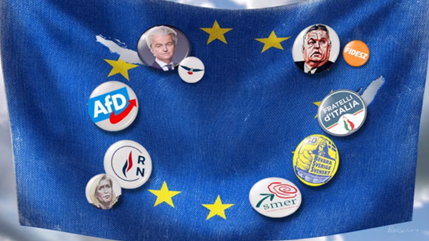Introduction

Recently, the political landscape of Europe has been marked by the ascendancy of right-wing parties. This shift, driven by various socio-economic and political factors, has profound implications for the future of the European Union (EU). Right-wing parties often emphasize nationalism, sovereignty, and skepticism towards supranational institutions, challenging the foundational principles of the EU. This blog piece explores the impact of the rise of right-wing parties on the future of the EU, examining the potential consequences for unity, democratic values, multilateral cooperation, immigration policies, and economic stability.
Erosion of Unity and Solidarity
One of the core principles of the EU is the promotion of unity and solidarity among its member states. However, the rise of right-wing parties, with their strong emphasis on national sovereignty and Euroscepticism, poses a significant threat to this principle. Right-wing parties often advocate for the repatriation of powers from Brussels to national governments, undermining the sense of collective decision-making that has been central to the EU's functioning.
The increasing influence of nationalist rhetoric can lead to a more fragmented Union, where member states prioritize national interests over collective European goals. This fragmentation can weaken the EU’s ability to respond effectively to common challenges, such as economic crises, security threats, and environmental issues. As a result, the erosion of unity and solidarity may undermine the EU’s effectiveness and credibility on the global stage.
Threats to Democratic Values
The rise of right-wing populism, characterized by its authoritarian tendencies and often divisive rhetoric, poses significant threats to the democratic values upon which the EU is founded. Right-wing parties frequently challenge established democratic norms, such as the independence of the judiciary, freedom of the press, and the protection of minority rights.
In countries where right-wing parties have gained power, there have been instances of democratic backsliding, with efforts to curtail the independence of democratic institutions and suppress dissent. This erosion of democratic norms and values within individual member states can have a corrosive effect on the EU as a whole, threatening its commitment to democracy, human rights, and the rule of law. If these trends continue, the EU may face difficulties in maintaining its normative framework and ensuring compliance with its foundational principles among all member states.
Challenges to Multilateral Cooperation
The EU’s ability to address transnational issues, such as climate change, terrorism, and economic instability, relies heavily on robust multilateral cooperation. However, right-wing parties often prioritize unilateral actions and are skeptical of supranational institutions. This stance can hinder collaborative efforts and compromise the EU’s capacity to respond effectively to global challenges.
For instance, climate change is a pressing issue that requires coordinated action at the regional and global levels. The rise of right-wing parties, which may prioritize national economic interests over environmental concerns, can obstruct the EU’s efforts to implement ambitious climate policies and achieve its sustainability goals. Similarly, in the realm of security, right-wing skepticism towards collective defense mechanisms and intelligence sharing can weaken the EU’s ability to address terrorism, cyber threats, and other transnational security challenges.
Impact on Immigration and Asylum Policies
Right-wing parties’ stringent immigration policies and anti-refugee rhetoric pose significant challenges to the EU’s commitment to humanitarian principles and international obligations. These parties often advocate for stricter border controls, reduced immigration quotas, and tougher asylum procedures, which can lead to restrictive measures that undermine the rights and protections afforded to refugees and migrants.
The adoption of such policies can result in human rights violations, increased tensions at borders, and a fragmented approach to migration management within the EU. Moreover, the rise of anti-immigrant sentiment can exacerbate social divisions, fuel xenophobia, and create an environment of hostility towards newcomers. This not only undermines the EU’s values of inclusivity and solidarity but also poses risks to social cohesion and stability within member states.
Economic Consequences
The rise of protectionist policies advocated by right-wing parties can disrupt the EU’s internal market, trade relations, and economic integration. Right-wing parties often promote economic nationalism, seeking to prioritize domestic industries and limit foreign competition. While these policies may appeal to certain segments of the electorate, they can have adverse effects on the overall economic stability and growth of the EU.
Protectionist measures can lead to trade disputes, reduced investment, and decreased economic cooperation among member states. This can weaken the EU’s competitiveness on the global stage and hinder its ability to negotiate favorable trade agreements. Additionally, economic fragmentation can exacerbate disparities between member states, undermining the goal of economic convergence and cohesion within the EU.
Conclusion: Navigating the Future of the EU
The rise of right-wing parties presents significant challenges to the future of the European Union. The erosion of unity and solidarity, threats to democratic values, challenges to multilateral cooperation, restrictive immigration policies, and economic nationalism all pose risks to the EU’s stability, effectiveness, and credibility.
Navigating these challenges requires a concerted effort by EU institutions and member states to uphold the principles of unity, democracy, and multilateralism. It is essential to engage in dialogue with right-wing parties and their supporters, addressing their concerns while reaffirming the importance of collective European action. Strengthening social cohesion, promoting inclusive policies, and fostering economic resilience are key strategies to counter the divisive effects of right-wing populism and ensure a stable and prosperous future for the European Union.
By maintaining a commitment to its core values and adapting to the evolving political landscape, the EU can continue to play a vital role in promoting peace, stability, and prosperity for its citizens and the wider world.
.png)
Commentaires